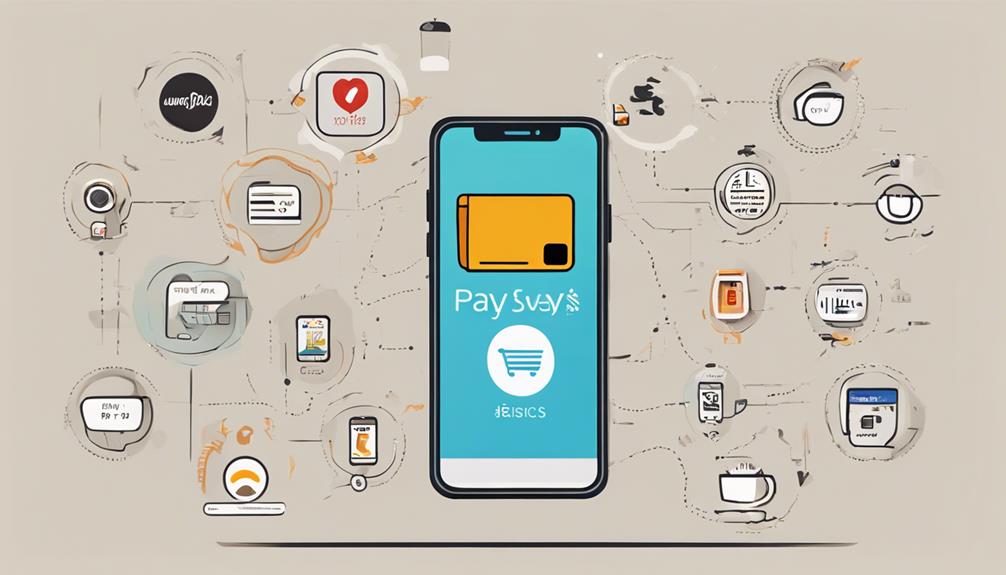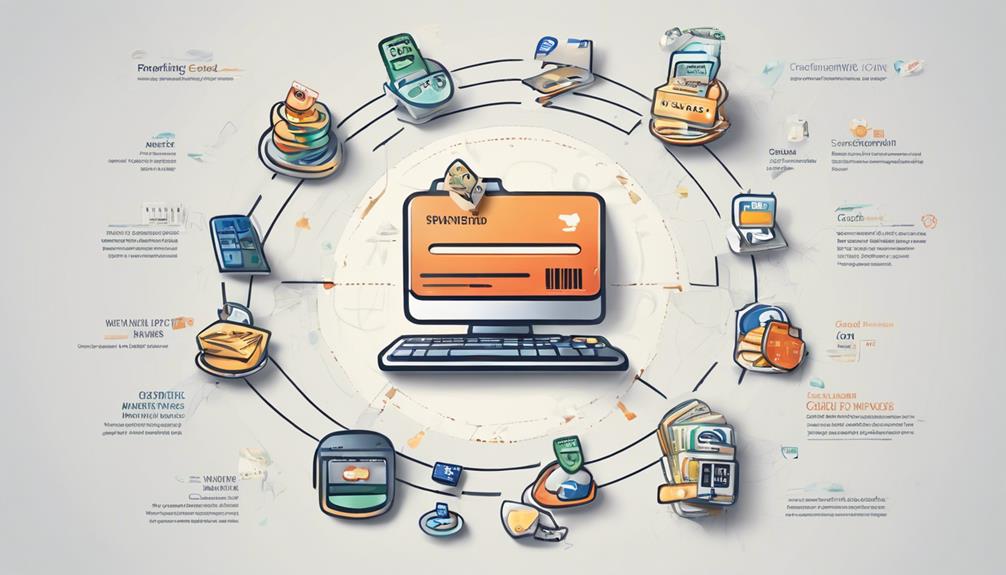When considering essential payment processing options for small businesses, it is important to think about key methods such as debit card processing, credit card processing, ACH processing, digital wallet processing, and payment gateway services. Debit card processing allows for direct fund transfers and increased security, while credit card processing can help expand your customer base and boost sales. ACH processing provides cost-effective fund debiting, and digital wallet processing improves checkout convenience and data security. Payment gateway services ensure secure online transactions and support multiple payment methods, thus increasing sales opportunities. Having a good understanding of these options is crucial for maintaining efficiency and customer satisfaction in the payment process.
Key Takeaways
- Debit card processing offers secure, efficient transactions with lower fees and enhanced customer satisfaction.
- Credit card processing expands customer base, boosts sales, and requires a merchant account.
- ACH processing is cost-effective, reliable, and convenient for recurring payments with lower transaction fees.
- Digital wallet processing ensures secure transactions, quick checkouts, and enhanced customer trust.
- Payment gateway services streamline online payments, support various methods, and expand sales opportunities.
Debit Card Processing
Why is debit card processing a popular choice for small businesses?
Debit card processing allows merchants to directly transfer funds from a customer's bank account, providing a secure and efficient payment method. Small businesses often opt for debit card processing due to its convenience and widespread acceptance among consumers.
One key advantage is the lower processing fees associated with debit card transactions compared to credit cards, making it a cost-effective choice for businesses looking to manage expenses. Customers play a crucial role in this process as they need to input their Personal Identification Number (PIN) to complete transactions securely, adding an extra layer of protection for both parties involved.
By offering debit card processing, small businesses can cater to a broader customer base that prefers this payment option, enhancing customer satisfaction and potentially increasing sales.
Credit Card Processing

Credit card processing enables small businesses to accept convenient payments from customers using their credit cards. By incorporating a secure payment processing system, small business owners can offer their customers the flexibility of paying with credit and debit cards. While this option expands the customer base and enhances convenience, it's essential to consider the transaction fees associated with credit card transactions, typically ranging from 1.5% to 3.5% of the transaction amount.
To set up credit card processing, businesses need to establish a merchant account through a payment processor. This account facilitates online payment processing and ensures that transactions are conducted securely, with sensitive customer data protected through encryption and adherence to industry standards. Small business owners can leverage credit card processing to streamline their payment procedures and cater to a broader range of customers, ultimately boosting sales and fostering growth in their enterprises.
ACH Processing
Transitioning from credit card processing, small businesses can explore ACH processing as a cost-effective alternative for electronically debiting funds from customers' bank accounts for payments. ACH processing offers lower transaction fees, making it an attractive option for businesses looking to cut costs.
With ACH transactions typically taking 1-3 business days to process, it provides a reliable and efficient payment method for both businesses and customers. Setting up recurring payments through ACH processing is convenient for subscription services or membership dues, streamlining the payment process for all parties involved.
Regulated by NACHA, the National Automated Clearing House Association, ACH processing ensures secure and reliable fund transfers, giving businesses peace of mind when handling electronic debits. Small businesses can benefit from the ease and affordability of ACH processing while maintaining control over their payment processing options.
Digital Wallet Processing

Digital wallet processing offers a secure way for customers to store payment information, facilitating quick and convenient transactions. With options like Apple Pay, Google Pay, Samsung Pay, and PayPal, businesses can cater to a wide range of users seeking mobile payment solutions.
These digital wallets utilize tokenization technology to safeguard sensitive payment data, ensuring a safe and efficient transaction process.
Secure Online Transactions
When making online purchases, utilizing secure digital wallet processing offers customers a convenient and safe way to store and use their payment information.
Digital wallets, such as Apple Pay, Google Pay, and PayPal, employ encryption and tokenization to safeguard sensitive payment data during transactions. This advanced security measures ensure that customer information remains protected from potential cyber threats.
With digital wallet processing, customers can enjoy a seamless checkout experience while having the flexibility to make quick and secure payments on various devices.
Businesses that integrate digital wallet options enhance their checkout process, instilling trust and confidence in their customers. By prioritizing secure online transactions, both customers and businesses benefit from a safer and more efficient payment experience.
Mobile Payment Solutions
Utilizing mobile payment solutions through digital wallet processing allows customers to securely make payments using their smartphones. Digital wallets like Apple Pay, Google Pay, Samsung Pay, and PayPal Mobile store various payment information for convenient transactions.
These mobile payment options enable contactless payments, perfect for in-person purchases. The use of tokenization technology by digital wallets enhances security by substituting sensitive data with unique tokens, ensuring secure transactions.
With smartphone payments becoming increasingly popular, small businesses can benefit from offering these secure and convenient payment methods to their customers. Embracing mobile payments and digital wallets not only streamlines the payment process but also provides an added layer of security for both businesses and consumers.
Payment Gateway Services

Payment gateway services play a crucial role in facilitating secure online transactions for small businesses. When considering payment gateway options for your business, keep in mind the following key points:
- Secure Transactions: Payment gateways ensure that online payments are processed securely, protecting both your business and your customers from potential fraud.
- Efficient Processing: By integrating a payment gateway, small businesses can streamline the online payment process, making transactions quicker and more convenient for customers.
- Support for Various Payment Methods: Payment gateways support a variety of payment options, including credit cards, debit cards, digital wallets, and ACH bank transfers, catering to diverse customer preferences.
- Enhanced Sales Opportunities: Accepting online payments through a payment gateway can expand your customer base and increase sales opportunities by offering a convenient and accessible payment method.
Selecting the right payment gateway is essential for ensuring a smooth, secure, and efficient online payment experience for your small business and its customers.
Determining the Right Processor

When determining the right processor for your small business, it's essential to consider:
- Processor selection tips
- Comparing providers
- Analyzing pricing and fees
These factors play a crucial role in making an informed decision that aligns with your business's unique needs. By evaluating these aspects diligently, you can ensure a smooth payment processing experience that meets your requirements.
Processor Selection Tips
In selecting the right payment processor for our small business, we must carefully assess our size, type, and specific payment processing requirements. When choosing a processor, consider evaluating the features, fees, security measures, and customer support offered by different providers.
To ensure we make an informed decision, we should also compare scalability, growth potential, recommendations, and reviews from other small business owners. Additionally, looking for flexible contract terms that can adapt to our changing business needs is crucial.
Comparison of Providers
To determine the right payment processor for our small business, we need to conduct a thorough comparison of providers based on key factors such as business size, payment options, fees, security, and integration.
When comparing providers, consider aspects like payment gateways, fee per transaction, advanced fraud protection, accepting payments, robust security features, and a comprehensive e-commerce platform.
Look for a processor that offers robust security features to safeguard transactions, ensures compatibility with your business size and growth potential, and provides reliable customer support.
Evaluating the scalability of the processor, taking into account recommendations and reviews from other small business owners, will help in making an informed decision.
Choosing a payment processor with the right blend of features and support is crucial for the smooth operation of our business.
Pricing and Fees
Discussing pricing and fees for payment processors involves analyzing transaction costs to determine the most cost-effective option for our small business. When evaluating payment processors, it's crucial to understand various fee structures, such as transaction fees and flat-rate pricing.
Payment processors earn revenue through transaction fees, which typically include a percentage of the transaction amount plus a flat rate. Some processors offer interchange-plus pricing, transparently passing on interchange fees set by card networks.
Flat-rate pricing models simplify fee structures by charging a consistent rate for all transactions, regardless of card type. To find the most cost-effective payment processor, it's essential to compare and comprehend these different pricing models.
Business Needs Assessment

Assessing our small business's needs entails evaluating transaction volume, average ticket size, and payment frequency. Understanding customer preferences for payment methods is vital for selecting the right processing options. By identifying peak sales periods and seasonal fluctuations, we can choose scalable payment solutions that align with our business demands.
Considering future growth projections and expansion plans guides decision-making for payment processing, ensuring that we invest in solutions that can accommodate our evolving needs. Analyzing the necessity for in-person, online, or mobile payment capabilities aids in selecting appropriate processors that cater to our diverse customer base.
Researching Available Options

When researching available payment processing options, it's crucial to compare pricing structures, evaluate integration capabilities, and consider customer support.
Understanding the fees associated with different providers, assessing how well they can work with your existing tools, and ensuring reliable support are key factors in making an informed decision.
Compare Pricing Structures
Researching available options for payment processing involves comparing pricing structures, transaction fees, and flat rates offered by different processors. When evaluating payment processors, consider the following key points:
- Examine the percentage-based fees, which can vary between 1.5% to 3% per transaction.
- Look into additional costs like chargeback fees, international transaction fees, and monthly service fees.
- Compare the pricing models based on your business volume and transaction frequency.
- Evaluate the total cost of payment processing, including setup fees, hardware costs, and any hidden charges.
Evaluate Integration Capabilities
To ensure seamless payment processing, businesses must prioritize evaluating the integration capabilities of available payment processors.
It's essential to research payment processor options that align with the integration needs of accounting software, e-commerce platforms, and other critical tools.
Look for processors offering easy integration through APIs, plugins, or direct connections to establish an efficient payment processing workflow. Considering the ease of integration is vital in selecting a processor to facilitate a smooth transition and streamline data flow.
Opting for payment processors with robust integration capabilities can enhance operational efficiency and boost overall business performance. By connecting existing tools and systems effectively, businesses can create a cohesive and efficient payment processing ecosystem.
Consider Customer Support
After evaluating integration capabilities, our focus shifts to researching available options for customer support when considering payment processors. When assessing customer support, it's crucial to consider factors like response times, dedicated support teams, and channels for support.
Here are some key points to keep in mind:
- Look for payment processors offering 24/7 customer support for quick issue resolution.
- Check user reviews to gauge the effectiveness of customer support.
- Prioritize processors with dedicated support teams to ensure prompt assistance.
- Consider the different support channels available, such as phone, email, live chat, and FAQs.
Evaluating Fees and Pricing

When evaluating fees and pricing for small business payment processing, it's crucial to consider factors such as transaction volume, average ticket size, and business type to determine the overall cost effectively.
Various pricing models exist, including flat-rate pricing, interchange-plus pricing, and tiered pricing. Flat-rate pricing charges a fixed percentage and flat fee per transaction, making it suitable for businesses with low transaction volumes.
Interchange-plus pricing offers transparency by separating the processor's fee from the card networks' fees. On the other hand, tiered pricing structures transactions into different risk-based tiers, each incurring different processing fees.
Understanding these models and evaluating fees based on your business's specific needs is essential to optimize costs. Keep in mind that transaction fees typically range from 1.5% to 3.5% of the transaction amount, in addition to a flat fee per transaction.
Checking for Integrations

Let's smoothly shift our focus to the importance of checking for integrations when selecting a payment processor for small businesses. Ensuring seamless integration with your existing tools and software is crucial for a streamlined payment process. Here are some key points to consider:
- Look for payment processors that offer API integrations to connect with your e-commerce platform, accounting software, and other business systems.
- Check for compatibility with popular website builders, online shopping carts, and point-of-sale systems to enhance your customer payment experience.
- Confirm that the payment processor supports multiple currencies and payment methods to cater to a diverse customer base and expand your business globally.
- Consider the ease of integration with mobile payment solutions and contactless payment technologies to stay up-to-date with evolving consumer preferences and trends.
Considering Security Measures

Ensuring robust security measures is paramount when selecting a payment processor for small businesses. Fraud prevention is a critical aspect of security measures, and implementing advanced fraud protection tools can help safeguard against unauthorized transactions and data breaches.
Secure payment processing solutions, including encryption, tokenization, and PCI compliance, are essential to protect sensitive customer data. Payment gateways that adhere to industry standards ensure safe transactions and prevent fraud.
Regular security audits and updates play a vital role in maintaining the integrity and reliability of the payment processing system. Compliance with regulations such as PCI DSS enhances the overall security posture of the payment processing infrastructure.
Frequently Asked Questions
What Payment Method Is Best for Small Businesses?
For small businesses, the best payment method varies based on factors like transaction volume, industry type, customer base, and cost-effectiveness. We prioritize security, ease of use, and integration capabilities to streamline financial transactions.
How Do I Set up Payment Processing for My Small Business?
To set up payment processing for our small business, we carefully choose a processor that fits our needs. We complete an application, set up a merchant account, and consider fees, security, integration, and support.
What Is the Best Payment Processor for Online Business?
For online businesses, the best payment processor is one that fits your needs. Consider Stripe for customization, Square for diverse payment types, PayPal for low fees, WorldPay for international payments, and GoCardless for automated bank payments.
What Are the Basics of Payment Processing?
We handle payment processing like maestros, orchestrating secure fund transfers. Consumers, merchants, banks, networks, issuers, and processors dance in harmony. Fees based on a percentage and flat rate keep our business tempo steady.
What Payment Processing Options Are Most Essential for Small Businesses?
For small businesses, having essential payment processing equipment is crucial. Having a reliable credit card terminal, mobile payment option, and online payment gateway can help streamline transactions and improve customer satisfaction. These options allow businesses to accept payments in various forms, making it convenient for their customers to make purchases.
Conclusion
In conclusion, when it comes to small business payment processing options, it's essential to choose the right solution that fits your needs. Whether you opt for debit card, credit card, ACH, digital wallet processing, or payment gateway services, each option has its own benefits and considerations.
Remember to research available options, evaluate fees, check for integrations, and consider security measures. Like a painter choosing the perfect brushstroke, selecting the right payment processing method can make all the difference in your business operations.









